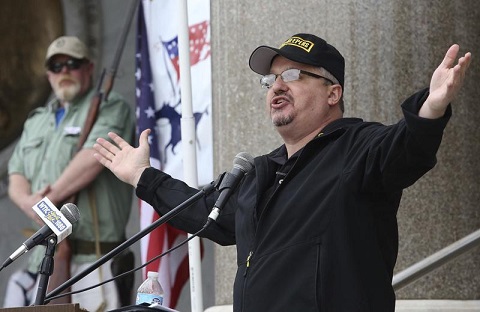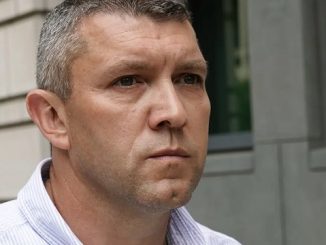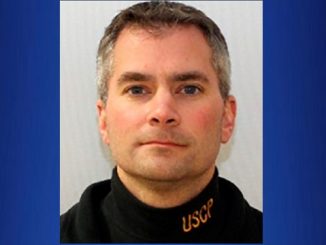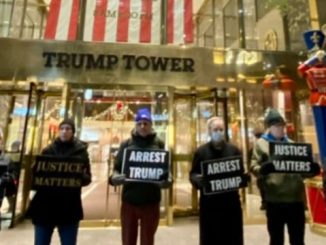
Members of the Oath Keepers, a far-right militia group, will go on trial after jury selection begins Tuesday in one of the most high-profile cases stemming from the 6 January 2021 attack on the US Capitol.
Among those being tried is the group’s leader, Stewart Rhodes, who is charged, along with four others, with seditious conspiracy – plotting to oppose the transfer of presidential power. They have pleaded not guilty.
The trial in Washington could be the most significant 6 January case yet, given the seriousness of the charges and the potential to answer a key question: to what extent was the storming of the US Capitol planned in advance?
What is the Oath Keepers?
A pro-gun, anti-government group launched in 2009, the Oath Keepers began with a rally in Lexington, Massachusetts – site of one of the first battles in the Revolutionary War.
Its founder, Mr Rhodes, is a former US Army paratrooper who studied at Yale Law School and was once an aide to libertarian Republican congressman Ron Paul of Texas.
The group is named after the oath of service that police, military and other officials take. Those taking the military oath, for instance, pledge to “support and defend the Constitution of the United States against all enemies, foreign and domestic”.
The Oath Keepers focus recruitment on people with military and law enforcement experience, along with other frontline “first responders”.
Extremism researchers have kept tabs on the group from the beginning, but it began to get a bigger profile when armed members started popping up in the middle of protests and civil unrest.
In 2014, they appeared at an armed standoff between a Nevada rancher and law enforcement. Later that year the Oath Keepers were spotted in Ferguson, Missouri, during protests after the shooting death of a black man, Michael Brown, by a police officer.
In that case, they said they were protecting business interests in the area, though they are not police.
“The danger with that is they are inserting themselves in already tense situations,” said Alex Friedfeld, an investigative researcher with the Anti-Defamation League (ADL) Center on Extremism. “It escalates the likelihood of violence.”
What did the Oath Keepers do on 6 January 2021?
Prosecutors say Mr Rhodes began a campaign to reject the results of the November 2020 election two days after the vote, while ballots were still being counted. On 5 November, the Oath Keepers’ leader told supporters on Signal, a private messaging app: “We aren’t getting through this without a civil war. Too late for that. Prepare your mind, body, spirit.”
Mr Biden was declared the winner of the election on 7 November 2020, following days of vote-counting.
According to a federal indictment, Mr Rhodes and others bought thousands of dollars of weapons and gear over the next two months, made plans to stash guns, and organised members into military-style units.
On 6 January 2021, a melange of groups – along with hundreds of individuals apparently unconnected to any organisation – assembled outside the Capitol after then-President Donald Trump held a rally nearby.
Mr Trump urged supporters to march to congressional headquarters to “peacefully and patriotically make your voices heard”, but also told the audience: “And if you don’t fight like hell, you’re not going to have a country anymore.”
Those who gathered included Oath Keepers, members of the all-male far-right Proud Boys, militia groups such as the Three Percenters, and believers in QAnon, a conspiracy theory.
Some allies of former President Trump have downplayed the riot by characterising it as a spontaneous gathering, during which most participants stayed outside the Capitol building and went home after Mr Trump made a statement.
But in the months since the violence, evidence has emerged of prior planning and potential co-ordination between groups.
For instance, footage shot by documentary maker Nick Quested shows Mr Rhodes meeting Enrique Tarrio, leader of the Proud Boys, on the evening of 5 January 2021.
There’s no evidence that Mr Rhodes himself entered the Capitol on the day of the attack, but prosecutors say that other members of Oath Keepers did.
On trial alongside Mr Rhodes are:
- Thomas Caldwell, a former Navy officer from Virginia who once worked for the FBI. Mr Caldwell allegedly helped prepare Oath Keepers teams to rapidly transport weapons from outside of Washington – which has relatively strict gun laws – to the Capitol. Prosecutors say he kept a “death list”, which included the name of an elections official in Georgia.
- Kelly Meggs, head of the Florida chapter of the Oath Keepers. He and other Oath Keepers allegedly marched up the east steps of the Capitol and stormed a set of doors. Other legal filings alleged that Mr Meggs boasted on Facebook messages about creating an alliance with Proud Boys and Three Percent militia members.
- Kenneth Harrelson, also from Florida, allegedly roamed the House of Representatives chamber searching for Speaker Nancy Pelosi, but did not find her.
- Jessica Watkins, an Afghanistan war veteran from Ohio. The indictment says she charged into the Capitol and encouraged people to push against a line of police officers guarding the Senate chamber. During the riot, Ms Watkins messaged other Oath Keepers, telling them that 30-40 members were “sticking together and sticking to the plan”.
Mr Rhodes and others are accused of continuing to plot after the riot. On the evening of 6 January he sent another message: “Patriots entering their own Capitol to send a message to the traitors is NOTHING compared to what’s coming.”
What is seditious conspiracy?
In total, more than 870 people have been arrested in connection with the attack, according to Department of Justice figures.
The case against the Oath Keepers group is notable because it includes some of the most serious charges to date. Seditious conspiracy is a crime involving a plot to attack or overthrow the state, but which stops short of treason – waging war against the government.
“This is certainly one of the biggest trials to date for the Department of Justice in their [6 January] prosecutions,” said Jon Lewis, research fellow at George Washington University’s Program on Extremism.
All five defendants have pleaded not guilty. If convicted, they could face up to 20 years in prison.
In total, at least 20 Oath Keepers members have been charged with a variety of crimes, and Mr Tarrio and other Proud Boys members will stand trial on seditious conspiracy charges in December.
Fractures in the group
The trial could also show how the group has splintered since the Capitol riot. Three Oath Keepers have already pleaded guilty to seditious conspiracy and could be called as witnesses at the trial.
Earlier this month the ADL analysed a leak of Oath Keeper membership rolls. It found hundreds of US public officials, police officers and soldiers on the lists, although a number are no longer members or have since rejected the organisation.
Experts say the threat from far-right groups remains regardless of the outcome of the trial and other high-profile cases.
“Even if the Oath Keepers were to cease functioning, even if their brand and logo disappear from public view, the rhetoric and grievances that continue to stoke violence in this country are alive and well,” says Mr Lewis.
Source: bbc.co.uk






Be the first to comment